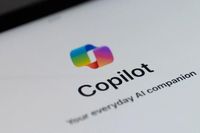Microsoft has begun rolling out an AI-powered tool, Copilot+ Recall, that captures snapshots of user screens every few seconds. The feature is currently available in preview mode for certain PC and laptop users utilizing Microsoft AI. This rollout marks the relaunch of a function that was previously dubbed a "privacy nightmare" when it was first introduced last year.
The company initially suspended the launch in 2024, but after conducting tests with a limited number of users, it has started to expand access to those enrolled in its Windows Insider software testing program. Microsoft has announced that Recall will be available globally, although users based in the European Union will have to wait until later in 2025 to access the feature.
Users can opt in to utilize Recall and are assured by Microsoft that they can "stop saving snapshots at any time." The primary aim of Recall is to facilitate easier searches for PC users through their past activities, which include files, photos, emails, and browsing history. For instance, Microsoft explained that a user who spotted a dress online a few days ago could quickly locate it using this feature.
However, the feature has drawn significant criticism. Dr. Kris Shrishak, a privacy activist who previously labeled Recall a "privacy nightmare," stated that while the opt-in mechanism represents "an improvement," there are still concerns regarding potential misuse. He emphasized that information about other individuals, who cannot provide consent, will be captured and processed through Recall. This raises ethical questions about user privacy.
Moreover, Recall's capability to save images from emails and messaging apps, such as WhatsApp, means that images and messages from others will be stored. Dr. Shrishak pointed out that this is akin to a user taking a screenshot of a received message. He warned, "Think about messages from Signal that could be stored on Recall forever," highlighting the potential for sensitive information to be retained indefinitely.
Concerns extend to the possibility that malicious actors could exploit the images saved by Recall if they gain access to a user's device. In response to these concerns, Microsoft has stated that Recall "does not share snapshots or data associated with Microsoft or third parties," and that information is not shared between different users. Additionally, Recall requires users to confirm their identity before they can access the snapshots.
The company clarified that the snapshots taken by Recall are stored locally on the user's computer. Users also have the option to select which applications can utilize the feature, and private browsing modes in some web browsers will not be subject to capture. Furthermore, users are given the ability to delete any screenshots that have been captured.
The rollout of Recall has prompted scrutiny from regulatory bodies. The UK data watchdog has indicated that it has "continued to engage with Microsoft on this matter." The Information Commissioner's Office (ICO) has expressed expectations for improved transparency regarding user data and has asserted that personal data should not be utilized for purposes beyond those for which it was originally collected.
Dr. Shrishak's concerns reflect a broader unease regarding the implications of AI technologies on privacy. As these tools become more integrated into daily life, the balance between convenience and privacy is increasingly scrutinized. While Microsoft touts the benefits of Recall, the ethical considerations surrounding the capture and storage of personal data cannot be overlooked.
Microsoft's commitment to user choice is evident in its opt-in approach, but the reality remains that the feature's potential for misuse looms large. With the ability to capture sensitive information, the stakes are high for users who may not fully understand the implications of engaging with such technology.
The ICO's involvement underscores the importance of regulatory oversight in the rapidly evolving landscape of AI. As technology continues to advance, ensuring that user rights are protected will be crucial in maintaining public trust.
In summary, while Copilot+ Recall aims to enhance user experience by facilitating the retrieval of past activities, it simultaneously raises significant privacy concerns. As Microsoft moves forward with this feature, the dialogue surrounding AI, privacy, and user consent will undoubtedly continue to evolve.


